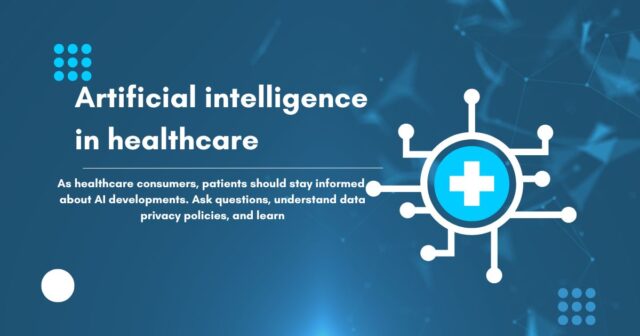Artificial intelligence (AI) is no longer a future concept. It has established itself as a game change in industries around the world. Perhaps one of the most influential areas is to change AI is the healthcare system. From rapid diagnosis of diseases to adapting the treatments and streamlining the operation of the hospital, AI is redefined how care is distributed.
This blog examines AIS innovative applications in the health care system, how it comes to both patients and professionals to good and further challenges. If you are curious about what is the future of medicine or wonder how AI can affect your health, then read.
How Artificial Intelligence is Transforming Diagnostics
Enhanced Disease Detection
Accurate and initial diagnosis is important in the treatment of diseases, and is AI Excel on it. Machine learning algorithms are able to analyze complex biological data by incredible movement. This AI system can detect medical images, laboratory results and patterns in genetic data that can miss human eyes.
For example, AI-driven systems such as Google’s Deepminds can detect diabetic retinopathy in eye scans with close accuracy. Similarly, cancer screening has been revolutionized, enabled doctors to identify the tumor at the early stage of mammograms and CT and scan faster and faster than traditional methods.
Predictive Risk Assessments
AI is not confined to diagnosing existing conditions. Predictive analytics powered by AI can evaluate a patient’s risk for diseases based on their family history, lifestyle, and genetic factors. This ability allows healthcare providers to adopt preventive measures and minimize the risk before symptoms appear.
One practical example is IBM Watson Health, which utilizes AI to identify individuals at risk of developing chronic illnesses like diabetes or heart disease.
Personalized Treatment Plans with AI
Precision Medicine and Tailored Therapies
Precision medicine focuses on creating treatments that cater to a patient’s unique genetic makeup, environment, and lifestyle. AI plays a pivotal role here by interpreting genomics data and identifying the most effective therapies for each individual.
Take drug development, for instance. Traditional methods of creating drugs are time-consuming and expensive. AI expedites this process by analyzing vast datasets to forecast how a new drug will interact with specific genes or proteins. Bio-pharma companies like Insilico Medicine are already leveraging AI to accelerate drug discovery while reducing costs.
Optimized Treatment Monitoring
Once a patient begins their treatment, AI ensures continuous improvement. Wearable devices equipped with AI algorithms track patients’ vitals in real-time, identify anomalies, and notify medical staff when intervention is necessary. This creates a more responsive approach to healthcare.
The Role of AI in Hospital Operations
Administrative Efficiency
Behind the scenes, AI is optimizing tedious but essential administrative tasks. AI-backed software can automate patient scheduling, streamline medical billing, and improve resource allocation in hospitals.
For instance, applications like Olive are designed to reduce the burden of manual data entry and create better workflow management for healthcare facilities. By taking away repetitive tasks, AI gives medical professionals more time to focus on patient care.
Enhanced Supply Chain Management
Hospitals often struggle with having either too many or too few resources. AI combats this issue through supply chain optimization. Predictive algorithms can forecast demand for medical supplies based on historical data, patient volumes, and seasonal trends, reducing waste and ensuring that resources are always available when needed.
Challenges of Artificial Intelligence in Healthcare
While the potential for AI to transform healthcare is clear, its integration comes with challenges.
- Data Privacy Concerns: AI heavily depends on patient data. Ensuring that this data remains safe from breaches while adhering to regulations like HIPAA is crucial.
- Bias in Algorithms: AI systems are only as good as the data they’re trained on. If this data is biased, marginalized communities could face unequal treatment.
- Human-AI Collaboration Gaps: AI may never fully replace human judgment in healthcare. The challenge lies in integrating AI into workflows smoothly so that doctors and machines work together effectively.
What the Future of AI in Healthcare Looks Like
Artificial intelligence is still in its early stages of adoption in healthcare, but the future looks promising.
- AI-powered Virtual Assistants could reduce the strain on overburdened healthcare systems by answering simple medical questions or assisting patients in managing chronic conditions at home.
- Robotic Surgery has the potential to redefine surgical precision through AI-guided tools.
- Global Health Benefits include providing AI-supported healthcare to underserved regions, helping to bridge gaps in quality and access around the world.
The global market for AI in healthcare is projected to surpass $190 billion by 2030, leaving no doubt that this technology represents the future of medicine.
Steps Healthcare Stakeholders Can Take
Healthcare Providers
Invest in AI education and training programs for clinicians to help them adapt to the technology. Collaborate with AI developers to ensure that tools are designed with usability in mind.
Policymakers
Establish frameworks to address concerns around data security, ethics, and AI governance. This will create a more inclusive and transparent adoption process.
Patients
As healthcare consumers, patients should stay informed about AI developments. Ask questions, understand data privacy policies, and learn how AI might enhance the care they receive.
Discover the Power of AI in Healthcare
Artificial intelligence is not just a discussion in the health care system; This is already a revolution. From rapid detection to individual treatment plans, AI forms the way it provides care, and provides it more efficient, accurate and patient -centered.
Are you ready to find out what AI can do for health services? While the challenges remain, the ability to perform better results is enormous. By promoting collaboration between health professionals, decision makers and patients, we can enter into a new era with medicine.







